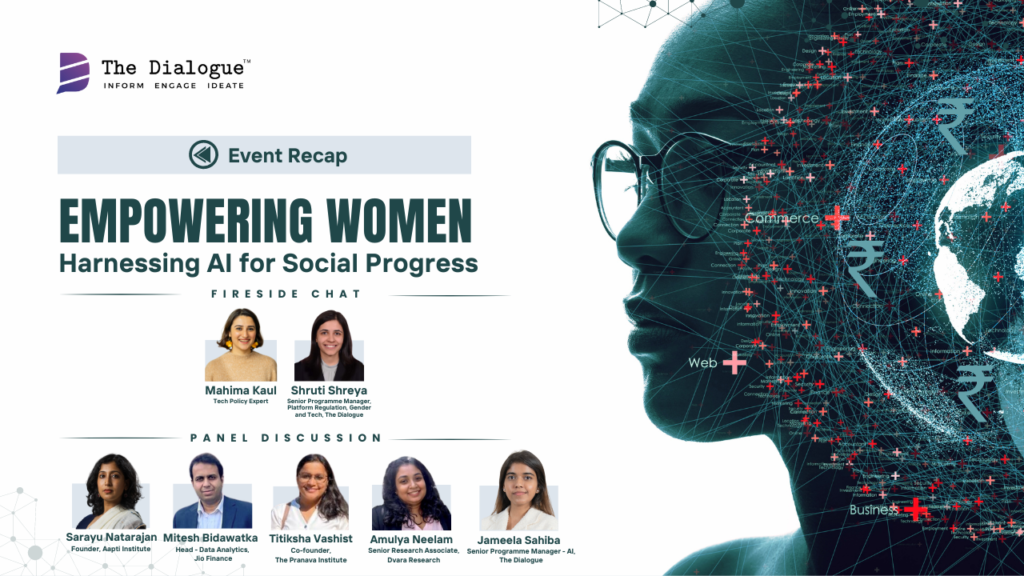Introduction
We find ourselves at a pivotal juncture where technology, particularly AI, is rapidly reshaping the landscape of financial services, offering unprecedented opportunities for inclusion and empowerment. For women whose financial footprints are often invisible in traditional systems, AI provides a new avenue by assessing creditworthiness through alternative data sources like mobile transaction histories, enabling access to formal credit and financial services. Despite these advancements, significant challenges remain, especially for women from low-income households. Although AI-driven financial inclusion initiatives are widespread, a broader assessment reveals ongoing disparities influenced by gender and socioeconomic factors.
Against this backdrop, The Dialogue organised a fireside chat followed by a panel discussion on 9th April 2024, focusing on the transformative role of AI in women’s empowerment and financial inclusion. The panellists included experts from various aspects of technology, finance, and policy: Mahima Kaul, Tech Policy Expert; Mitesh Bidawatka, Head – Data Analytics, Jio Finance; Titiksha Vashist, Co-founder of The Pranava Institute; Sarayu Natarajan, Founder, Aapti Institute; and Amulya Neelam, Senior Research Associate, Dvara Research.
The fireside chat focused on the role of AI in women’s empowerment, exploring the vast opportunities AI presents for enhancing women’s lives in areas such as education, healthcare, and economic independence. Following the chat, the panel discussion explored how AI can better serve women from low-income backgrounds in accessing formal financial services. Recognising the intersectionality of gender and class, the discussion identified the unique challenges women face across different socio-economic strata.
Insights from the Fireside Chat
- Distinguishing AI’s Gender Dynamics from Social Media
The discussion highlighted that disruptive tech, such as AI, has three key trends, each bearing implications for various aspects of society, particularly concerning the rights and safety of individuals. Firstly, disruptive technologies introduced by major players in the tech industry are notable, demanding substantial investments and access to vast amounts of data. This concentration of power raises concerns regarding the creators of AI and their primary focus on productivity, which could significantly impact labour dynamics, particularly affecting women.
Secondly, the intertwining of social media platforms with the dynamics of companionship shapes modern interpersonal interactions, influencing how individuals connect and engage with one another. However, such dynamics also raise concerns regarding safety challenges and liability, especially concerning the protection of women within online spaces. Despite the evolution of safety mechanisms within platforms, such safety and security concerns persist.
Thirdly, the integration of AI into various aspects of society underscores the importance of ethical considerations and human rights implications. As the technology progresses, questions arise regarding the accountability and liability of digital platforms, particularly concerning user-generated content and its potential to influence individuals negatively. Moreover, calls for gender inclusivity in the design and implementation of AI systems highlight the need for diverse perspectives to ensure equality and fairness.
The discussion underscored that addressing these complex issues requires a multifaceted approach, emphasising the intention behind the technological ecosystem alongside the ethical considerations embedded within its design and implementation. Recognising the pivotal role of both creators and users in shaping the impact of technology underscores the importance of fostering inclusivity, accountability, and responsibility within the digital sphere.
- AI’s Societal Impact: Going Beyond Gender
The discussion emphasised how the looming apprehensions of increased insecurity and vulnerability in the employment sector, particularly among women, present a pressing concern. While the proliferation of AI technologies may disrupt traditional labour markets by automating entry-level positions, there exists a transformative potential to view AI as a catalyst for upskilling and reskilling initiatives rather than as a threat to job security. By harnessing AI tools and platforms, individuals, including women, can access new learning opportunities and skill development programs, thereby enhancing their employability and adaptability in the evolving job market.
As new companies and startups emerge, driven by technological innovation, the ecosystem of opportunities expands, offering diverse pathways for women and other marginalised groups to participate in and benefit from the digital economy, paving the way for a future where such marginalised populations are empowered to navigate and thrive in an increasingly dynamic and technologically driven labour market.
Furthermore, despite the global reach of many digital platforms, a significant portion of the population, particularly in remote areas, still lacks internet access. As the barriers to entry gradually diminish, there remains an urgent need for greater integration of marginalised communities into the digital sphere, ensuring that AI technologies are inclusive and accessible to all.
Insights from the Panel Discussion
The fireside chat set the stage for the riveting panel, where experts from diverse backgrounds came together to further the discussion around the multifaceted role of AI in promoting financial inclusion for women, especially for women from low-income backgrounds, touching on key opportunities and challenges. While the intersection of AI and formal financial services can potentially transform access to resources for women globally, implementing these technologies comes with specific challenges that need addressing to ensure they benefit all user groups equitably.
- Ethical Concerns of Deploying AI in Financial Sectors
The panel discussion started by focusing on the ethical concerns related to deploying AI in the financial sector, particularly the risks it poses to gender-specific groups. Women often face unique risks when their personal data is used extensively for financial assessments like credit scoring. This can include higher vulnerabilities to privacy breaches and potential misuse of their personal information, which can have serious financial implications. The panel underscored that such ethical concerns are not unique to the financial sector but are exacerbated by the lack of female representation in data sets, leading to broader issues of access and equity.
- Data-Driven Decision Making and Gender Inclusion
The discussion then shifted to how service providers are increasingly becoming data-driven in their decision-making processes. With AI and data analytics becoming more powerful, there is a critical need to ensure gender diversity and inclusion. The discussion also emphasised the importance of acquiring alternative data sources and improving data maturity to enhance representation in the datasets used, which in turn could inform more equitable AI deployments.
- Infrastructure and Access Gaps
The discussion then addressed the significant access gaps that exist, particularly for women who are less likely to have access to formal financial services globally. These gaps are often exacerbated by infrastructural inadequacies. In regions like India, where AI is at the forefront of credit lending, there is a two-fold challenge of managing data access while ensuring safety and addressing the socio-economic and political realities that influence how AI technologies are deployed, including using indigenous languages to create more inclusive financial products.
- AI-Powered Financial Literacy and Interactive Tools
The discussion then also explored the potential of AI-powered financial literacy and education tools that are sensitive to language and cultural nuances. It was pointed out that while these tools are crucial for reducing information asymmetry and providing tailored financial advice, the complexity of these systems should not shift the burden entirely onto users, particularly those from low-income households for whom standard financial planning models are inadequate.
- Regulatory Challenges and Innovations
Towards the end, the discussion shifted to the regulatory challenges of ensuring financial inclusion efforts via AI do not outpace the safeguards necessary to protect users. The need for gender-disaggregated data to tweak policies and create more inclusive environments was discussed. Additionally, the potential for regulators themselves to use AI to oversee and manage these complex systems was considered a significant opportunity for enhancing regulatory frameworks.
- Conclusion and Recommendations
The session concluded with a consensus on the need for a comprehensive strategy to incorporate AI into financial services. It was acknowledged that AI has a substantial capacity to boost financial inclusion, especially for women, while also recognising the unique risks that demand prudent oversight. Drawing from the session’s insights and dialogue, the following recommendations were proposed to tackle these challenges effectively:
- Enhance Data Representation: Incorporate more diverse and representative data in AI models to ensure algorithms are equitable and inclusive.
- Strengthen Privacy Protections: Implement strong data protection measures to safeguard personal information, especially in systems that use extensive data for financial assessments.
- Develop Gender-Sensitive AI Tools: Tailor AI tools to meet women’s specific challenges and needs, enhancing fraud detection and financial literacy through a gender-sensitive lens.
- Promote Regulatory Innovation: Encourage regulatory bodies to use AI to monitor and regulate the financial sector, ensuring innovations are paired with appropriate safeguards.
- Expand Financial Literacy and Inclusion: Leverage AI to develop interactive and educational tools that cater to diverse linguistic and cultural backgrounds, making financial services more accessible and understandable.
- Address Language and Cultural Barriers: Invest in AI-driven financial services that accommodate various languages and cultural contexts to bridge accessibility gaps in underserved areas.
- Continuously Adapt Policies: Utilise gender-disaggregated data to refine policies and practices continuously, ensuring financial systems are inclusive and beneficial to all genders.
- Encourage Cross-Sector Collaboration: Foster ongoing dialogue between technology developers, financial institutions, policymakers, and community advocates to ensure AI solutions are comprehensive and inclusive.
The intersection of AI and women’s empowerment represents a promising frontier for innovation and social change. As we navigate the evolving landscape of financial services, it is essential to remain vigilant about the ethical implications of AI deployment and to prioritize inclusivity in our design and implementation strategies. By fostering collaboration across sectors and empowering women through education and access to technology, we can unlock the full potential of AI to create a more equitable and prosperous future for all. Let us continue to engage in meaningful dialogue, advocate for responsible AI development, and work towards a world where technology serves as a catalyst for positive societal transformation.
To delve deeper into the topics of trustworthy AI and responsible AI, we invite you to explore our publications: “Towards Trustworthy AI: Sectoral Guidelines for Responsible Adoption” and “Principles for Enabling Responsible AI Innovations in India: An Ecosystem Approach.” These research papers offer valuable insights and practical guidance on building AI systems that are transparent, accountable, and fair, ensuring that technology serves the best interests of society.
—Access Towards Trustworthy AI: Sectoral Guidelines for Responsible Adoption Research Paper here
—Access Principles for Enabling Responsible AI Innovations in India: An Ecosystem Approach Research Paper here

